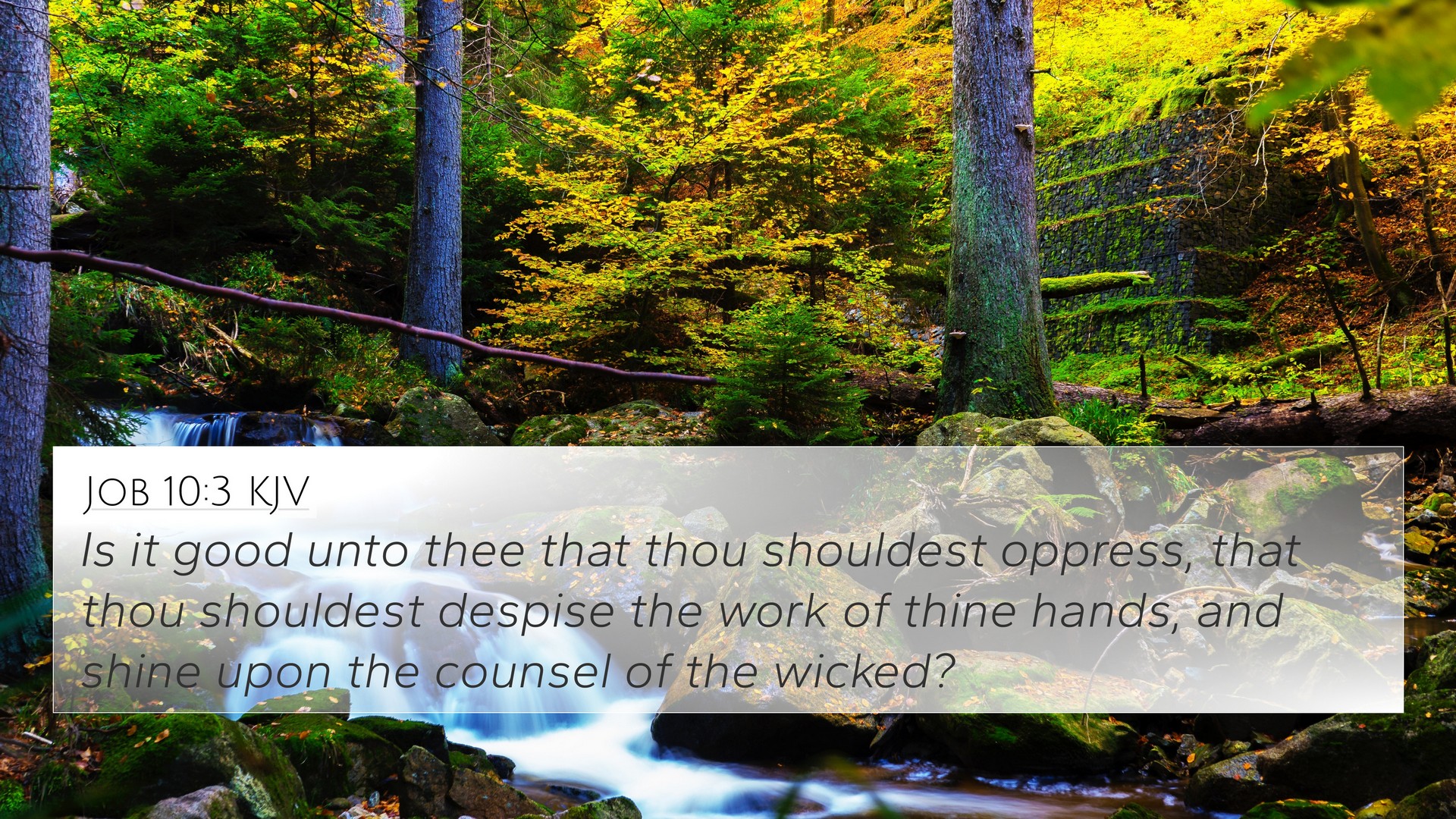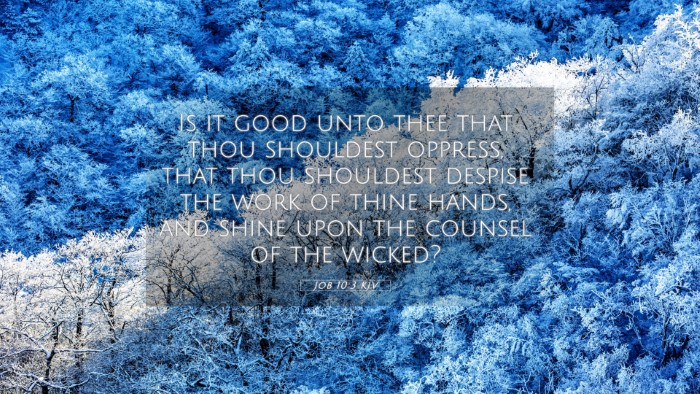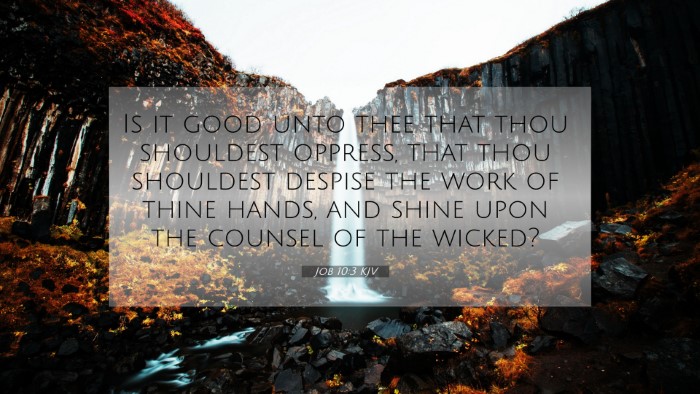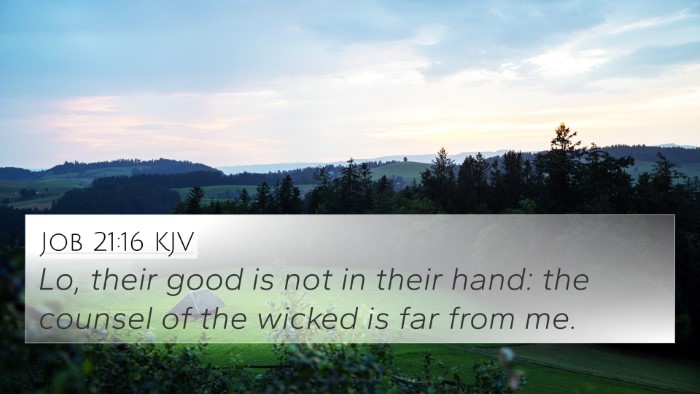Old Testament
Genesis Exodus Leviticus Numbers Deuteronomy Joshua Judges Ruth 1 Samuel 2 Samuel 1 Kings 2 Kings 1 Chronicles 2 Chronicles Ezra Nehemiah Esther Job Psalms Proverbs Ecclesiastes Song of Solomon Isaiah Jeremiah Lamentations Ezekiel Daniel Hosea Joel Amos Obadiah Jonah Micah Nahum Habakkuk Zephaniah Haggai Zechariah MalachiJob 10:3 Similar Verses
Job 10:3 Cross References
Is it good unto thee that thou shouldest oppress, that thou shouldest despise the work of thine hands, and shine upon the counsel of the wicked?
Uncover the Rich Themes and Topics of This Bible Verse
Listed below are the Bible themes associated with Job 10:3. We invite you to explore each theme to gain deeper insights into the Scriptures.
Job 10:3 Cross Reference Verses
This section features a detailed cross-reference designed to enrich your understanding of the Scriptures. Below, you will find carefully selected verses that echo the themes and teachings related to Job 10:3 KJV. Click on any image to explore detailed analyses of related Bible verses and uncover deeper theological insights.
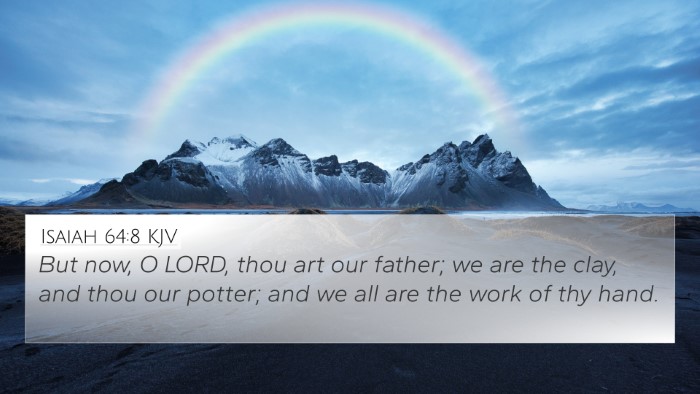
Isaiah 64:8 (KJV) »
But now, O LORD, thou art our father; we are the clay, and thou our potter; and we all are the work of thy hand.

Job 14:15 (KJV) »
Thou shalt call, and I will answer thee: thou wilt have a desire to the work of thine hands.
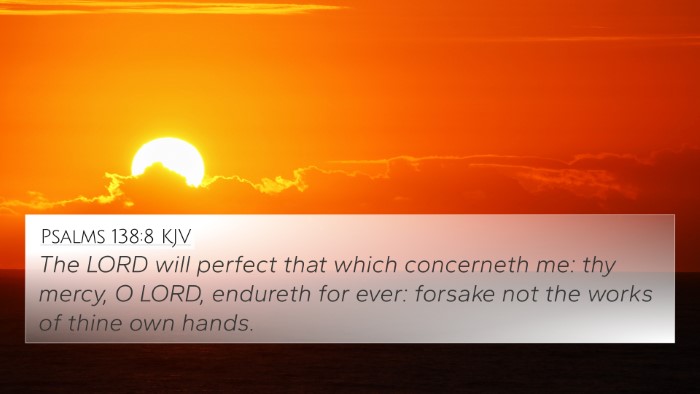
Psalms 138:8 (KJV) »
The LORD will perfect that which concerneth me: thy mercy, O LORD, endureth for ever: forsake not the works of thine own hands.

Jeremiah 12:1 (KJV) »
Righteous art thou, O LORD, when I plead with thee: yet let me talk with thee of thy judgments: Wherefore doth the way of the wicked prosper? wherefore are all they happy that deal very treacherously?

Job 36:7 (KJV) »
He withdraweth not his eyes from the righteous: but with kings are they on the throne; yea, he doth establish them for ever, and they are exalted.
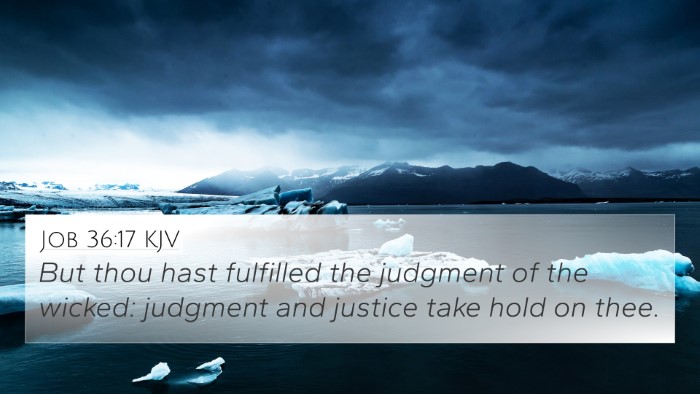
Job 36:17 (KJV) »
But thou hast fulfilled the judgment of the wicked: judgment and justice take hold on thee.

Job 40:2 (KJV) »
Shall he that contendeth with the Almighty instruct him? he that reproveth God, let him answer it.
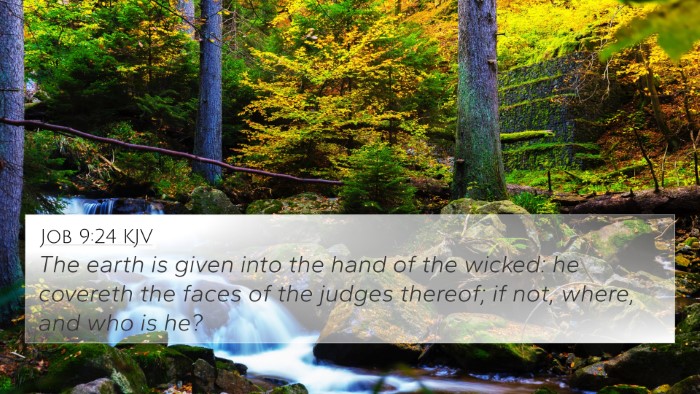
Job 9:24 (KJV) »
The earth is given into the hand of the wicked: he covereth the faces of the judges thereof; if not, where, and who is he?

Job 40:8 (KJV) »
Wilt thou also disannul my judgment? wilt thou condemn me, that thou mayest be righteous?

Job 22:18 (KJV) »
Yet he filled their houses with good things: but the counsel of the wicked is far from me.

1 Peter 4:19 (KJV) »
Wherefore let them that suffer according to the will of God commit the keeping of their souls to him in well doing, as unto a faithful Creator.
Job 10:3 Verse Analysis and Similar Verses
Understanding Job 10:3
Job 10:3 presents a poignant expression of Job's anguish and his desperate plea for justice. In this verse, Job confronts God, lamenting the treatment he has received in his suffering. This text is a part of Job's larger discourse where he articulates the severity of his plight and questions the divine justice he believes he has been denied.
Verse Text
Job 10:3 (ESV): “Does it please you to oppress, to despise the work of your hands and favor the designs of the wicked?”
Combined Insights from Commentaries
Matthew Henry's Commentary
Matthew Henry remarks that Job's question is deeply reflective of his feelings of injustice. He underscores Job's acknowledgment of God's sovereignty and the moral conflict he experiences. Henry explains that the "work of your hands" refers to God's creation, which Job feels is being treated unfairly in his own suffering.
Albert Barnes' Notes
Albert Barnes elaborates on the parallel between the courtesy of God and human expectation of justice. He notes that Job's rhetorical questioning reveals the perplexity of suffering under divine governance. Barnes emphasizes that Job appeals to God's character, suggesting that it is inconsistent with God's nature to treat his creations so harshly.
Adam Clarke's Commentary
Adam Clarke provides a historical context for Job's feelings, indicating how the language reflects a man at the end of his endurance. Clarke emphasizes the emotional weight of Job's appeal and reads it as an inquiry into whether God finds pleasure in oppressing His creation. He highlights Job's pain and confusion at the perceived injustices in his life.
Key Themes and Contextual Analysis
This verse encapsulates several theological and philosophical themes:
- The Problem of Suffering: Job questions the rationale behind his tribulations, raising the classic question of why the righteous suffer.
- The Nature of God: Job’s plea highlights a struggle to reconcile God's justice with the reality of human suffering.
- The Integrity of Creation: The reference to “the work of your hands” invites reflection on humanity’s value and God’s intentions with creation.
Cross-References
Job 10:3 can be linked to several other biblical texts that provide deeper insights into its meaning:
- Job 7:17-18: Questions the attention God pays to humans.
- Psalm 39:4-5: Reflects on the fleeting nature of life and God’s awareness of human suffering.
- Psalm 73:16-17: Expresses confusion over the prosperity of the wicked.
- Isaiah 45:9: Questions to the Creator about the purposes of Creation.
- Romans 9:20: Humans questioning God’s decisions concerning justice.
- 2 Corinthians 5:10: Discusses the judgment of works, underscoring divine justice.
- Hebrews 12:5-6: Discusses enduring discipline from God as an indication of His love for His children.
Exploring Connections Between Bible Verses
This verse serves as a bridge to various thematic connections across Scripture:
- Understanding the nature of suffering in Psalms.
- Connecting the character of God as just in Isaiah.
- Examining righteousness and justice in the letters of Paul.
Tools for Bible Cross-Referencing
To delve deeper into Bible verse connections, consider using:
- Bible Concordance for thematic study.
- Bible Cross-Reference Guide for systematic exploration.
- Digital Bible study tools for enhanced cross-referencing.
Conclusion
Job 10:3 encapsulates human despair in the face of perceived divine injustice. By exploring this verse through various commentaries and cross-references, we gain insights into Job's struggles, the nature of God, and the broader themes of suffering, justice, and the integrity of creation.
